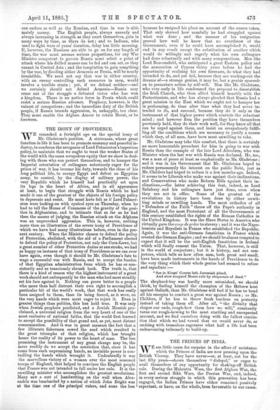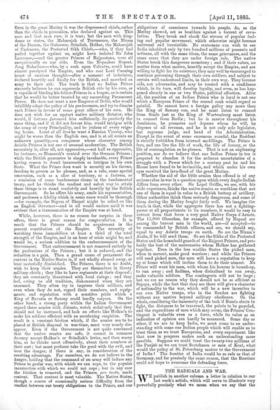THE PRINCES OF INDIA. THE PRINCES OF INDIA. Nv E see
little cause for surprise in the offers of assistance which the Princes of India are now pressing upon the British Viceroy. They have never—or, at least, not for the last fifty years—shown themselves " disloyal," or eager to avail themselves of any opportunity for shaking-off British rule. During the Mahratta Wars, the first Afghan War, the first and second Sikh Wars, the Persian War, and, indeed, in every serious struggle in which this generation has been engaged, the Indian Princes have either remained passively expectant, or have, on the whole, been favourable to our cause. Even in the great Mutiny it was the dispossessed chiefs, rather than the chiefs in possession, who declared against us. This man and that man rose, it is true; but the men with kingdoms or states, the Maharajah of Travancore, the Nizam of the Deccan, the Guicowar, Scindiah, Holkar, the Maharajah of Cashmere, the Protected Sikh Chiefs,—who, if they had pulled together against us, might have isolated Sir John Lawrence,—and the greater Princes of Rajpootana, were all unequivocally on our side. Even the Nepaulese Regent, Jung Buhadoor—who,. by a rush upon Calcutta, could have almost paralysed the Empire, and who cost Lord Canning hours of anxious thought—after a moment of indecision, declared heartily and finally for the British, and marched an army to their aid: The truth is that no Indian Prince sincerely believes he can supersede British rule by his own, or is capable of binding his fellow-Princes in a league, or is certain that he would be better treated by any succeeding Paramount Power. He does not want a new Emperor of Delhi, who would infallibly adopt the policy of his predecessors, and try to dismiss each Prince in favour of some great officer of his own. He does not wish for an upstart native military dictator, who would, if fortune favoured him sufficiently, do precisely the same thing, and if it did not favour him, would intrigue with the army of every Principality, and be jealous of every reigning house. Least of all does he want a Russian Viceroy, who might be worse than the English one, and is at all events an unknown quantity,—a conqueror whose character among Asiatic Princes is not one of unusual moderation. The British suzerainty is, after all, not oppressive,—not half so -oppressive, for instance, as Bismarck's control over the German Princes ; while the British guarantee is simply invaluable, every Prince having reason to dread insurrection or intrigue in his own State. What the Prince does want is security on his throne, freedom to govern as he pleases, and, as a rule, some special. concession, such as a slice of territory, or a fortress, or a remission of some burdensome clause in the fundamental treaty, and he thinks the readiest and safest way to attain these things is to stand resolutely and heartily by the British Government. So he offers his army, sends his representative, and professes a fidelity which in some cases would be thorough —for example, the Begum of Bhopal might be relied on like an English Governor—and in all would endure until it was evident that a transmutation of the Empire was at hand.
While, however, there is no reason for surprise in these offers, there is great reason for congratulation. It is much that the Princes should be acquiescent in the present constitution of the Empire. The necessity of watching them immobilises at least a third of the total strength of the Empire, and in an hour of crisis might be, and would be, a serious addition to the embarrassments of the Government. That embarrassment is not removed entirely by the professions of the Princes; but it is reduced, and the reduction is a gain. Then a grand cause of permanent discontent in the Native States is, if not wholly cleared away, at least materially diminished. The Princes, there is no doubt, wish to keep their armies. They are themselves in theory military chiefs ; they like to have regiments at their disposal ; they are constantly threatened with local risings ; and they feel, owing to old tradition, dishonoured when they are unarmed. They often try to improve their soldiers, and even when they do not, regard their numbers, and equipments, and reputation with a sensitive pride which a King of Bavaria or Saxony could hardly surpass. On the other hand, a strong party within the Indian Government regard these armies with distaste, watch sedulously that they should not be increased, and look on efforts like Holkar's to make his soldiers efficient with an unrelaxing suspicion. The result is a constant friction which, if the armies are to be placed at British disposal in war-time, must very nearly disappear. Even if the Government is not quite convinced that the native armies are safe, it cannot in common decency accept-Holkar's or Scindiah's levies, and then worry him, as he thinks most offensively, about their numbers or their cost ; but must perforce take the good with the evil, and bear the danger, if there is any, in consideration of the resulting advantage. For ourselves, we do not believe in the danger, holding that the command of an army will induce any Prince to prefer war, with which we can cope, to the popular insurrection with which we could not cope ; but in any case the friction is removed, and the Princes, pro tanto, made content. That content is most valuable. The Native States, though a source of occasionally serious difficulty from the conflict between our treaty obligations to the Prince, and our obligations of conscience towards his people, do, as the Mutiny showed, act as boulders against a torrent of revolution. They break and check the stream of popular feeling and popular movement, which otherwise might become universal and irresistible. No statesman can wish to see India inhabited only by two hundred millions of peasants and artisans, all with the same ideas, the same grievances, and the same sense that they are under foreign rule. The native States break this dangerous monotony ; and if their rulers, no matter from what motive, heartily accept the Empire, and are willing to fight for its existence, they may well be encouraged to continue governing through their own soldiers, and subject to certain well-understood limits, in their own way. They become aids, not adversaries, and may be treated with a confidence which, in its turn, will develop loyalty, and even, as has happened already in one or two States, political affection. After all, the position of an Indian Prince who is loyal is not one which a European Prince of the second rank would regard as painful. He cannot have a foreign policy any more than the King of Saxony can, and he must listen to counsel from Simla just as the King of Wurtemburg must listen to counsel from Berlin ; but he is master throughout his dominions, he promotes and deposes whom he will, he disposes of all revenue, and he is not only sole legislator, but supreme judge, and head of the Administration. Except in the event of some enormous scandal, the Resident is strictly forbidden from internal meddlings. The Prince is free, and can live the life of work, the life of luxury, or the life of contemplation as he pleases. That is not an unpleasing position, nor do we believe that one Indian Prince in ten is prepared to abandon it for the arduous uncertainties of a struggle with a Power which for a century past he and his House have found to be invincible, and which under his own eyes survived the lava-flood of the great Mutiny.
Whether the aid of the little armies thus offered is of any serious value in war is a question upon which every Anglo-Indian differs from every other. Sir Lepel Griffin, we see, with his wide experience, thinks the native armies so worthless that not one of them is equal in value to a British battery of artillery. Other authorities think them seriously dangerous, and some of them during the Mutiny fought fairly well. We imagine the truth is that, while the aggregate force has not a fightingpower at all proportionate to its numbers, it would be easy to extract from that force a very good Native Corps d'Armee. The 15,000 Ghoorkas, for example, offered by Nepaul are among the bravest men in the world, are—if accepted—to be commanded by British officers, and are, we should say, equal to any Asiatic troops on earth. So are the Nizam's Arabs, if he will send them. So are the Sikhs of the Protected States and the household guards of the Rajpoot Princes, and probably the best of the mercenaries whom Holkar has gathered together. Even in the less warlike States the picked men, when in earnest, make good warriors ; and while the Princes will send picked men, the men will have a reputation to keep up at home which will incline them to do their utmost. No Prince will want his men, with whom his honour is bound-up, to run away ; and Indians, when disinclined to run away, make valuable soldiers. The contingents will not be large ; but we see no reason why they should not be as efficient as Sepoys, while the fact that they are there will give a character of nationality to the war, which will be a new incentive to our own Native troops, who in the Soudan are fighting without any motive beyond military obedience. On the whole, considering the immensity of the task if Russia elects to fight, the distances to be traversed, the points to be guarded, and the expenditure of men which may occur, the Princes' Contingent is valuable even as a force, while its value as an indication of opinion can hardly be measured. Some day or other, if we are to keep India, we must come to an understanding with some one Indian people which will enable us to trust them as we trust Europeans, and every.experiment like that now in progress makes such an understanding more possible. Suppose we could trust the twenty-two millions of the Punjab as we can trust Scotchmen or men of Kent, what would the policy of St. Petersburg matter td the Government of India ? The frontier of India would be as safe as that of Germany, and for precisely the same reason, that the Russians could not hope to overcome the defending force.



































 Previous page
Previous page